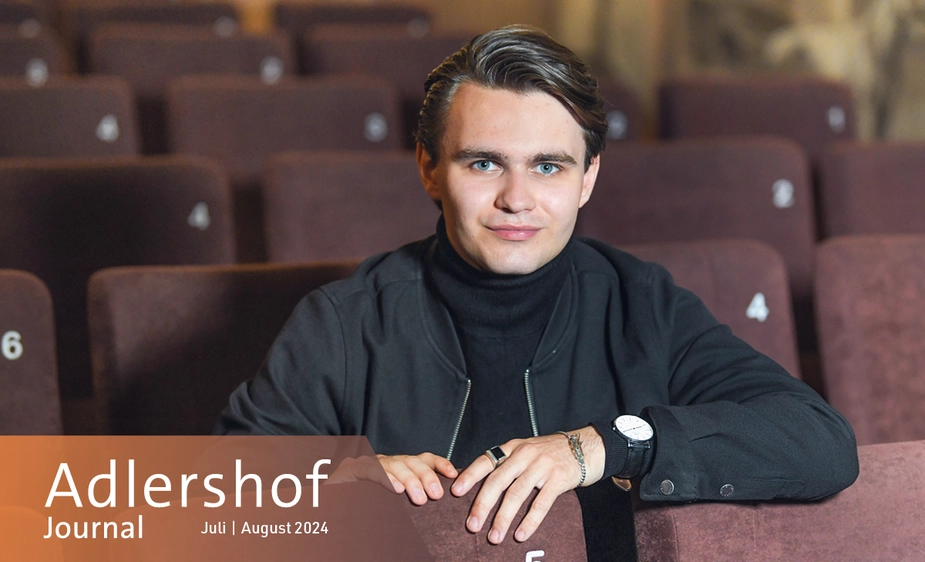Adlershof was a huge playground to me
How his neighbourhood turned actor Moritz Russ into an artist
First, Adlershof, then the whole world? Both a visionary and an artist, Moritz Russ could make it happen. His youth in Adlershof opened doors to the world of art. Russ is a jack-of-all-trades, writes poetry, turns them into music and music videos, produces films, and plays men, women, and children, or all of them at once. Now in his early twenties, he is studying at the Ernst Busch Academy of Dramatic Arts. The path that led him there was borne out of a mixture of coincidence and passion.
His mother worked as a care worker for people with mental disabilities, his father as a service technician. These weren’t the job profiles that Russ aspired to: “My heart has always been in art, albeit quietly. I was an outsider who wore black and hid in the back row.” Russ had no ambitions of ever standing on a big stage. At eight years old, a substitute teacher at Heide-Grundschule, his primary school, asked him to perform a story he wrote in front of his class and Russ discovered his stage self: “I was surprised and confused that it resonated so well.”
Not long ago, he thanked his teacher for it, who also arranged for initial jobs as a voice actor, for example, in “Pinocchio” with Mario Adorf, Anke Engelke and Ulrich Tukur. Russ went his own way, realising over 300 projects in Adlershof. He dabbled in puppetry, hosted events reading his own texts at KIEZKLUB Alte Schule, a community centre on Dörpfeldstrasse, and staged a summer theatre among the Am Adlergestell allotment gardens. The locals helped and tailored costumes for him free-of-charge. “Adlershof was a huge playground to me. I shot films everywhere, even at the kebab shop and the church. I thought that was pretty cool to be shaping the art and culture scene of Adlershof at my age. Nobody had done live radio plays and short film events here before.” In the end, 300 people waited in line on the pavement in front of “Kino Casablanca”.
Last year, Russ was asked if he wanted to become a part of the image campaign “Wir Adler” on behalf of the Lively Centres and Quarters Dörpfeldstrasse project. He agreed and had his photo taken at the cinema. His neighbourhood, or Kiez, as the Berliners call it, means a lot to him. He is now also hosting a guided art and culture tour of Adlershof, which was organised as part of the “Brückenschlag on Tour” series, organised by WISTA Management GmbH and the Lively Centres and Quarters Dörpfeldstrasse project, during which he speaks on all the projects he has realised so far. When he set his collection of poems “Notizen” to music, Russ recorded a video in the legendary Great Wind Tunnel. The Wind Tunnel is not usually open to the public and renting it is expensive, but where there’s a Russ, there’s a way. “I spent several weeks looking for the right person to contact, wrote a nice email and introduced myself, and it worked out!” A famous German band shot a video at the Wind Tunnel. When they took a 30-minute break, Russ jumped right in. What the band did remained a secret. There was only one simple requirement and that was that Russ takes some nice pictures in the Wind Tunnel. “Had I not secured that spot, I would have come up with something else. I see it like Christoph Schlingensief: ‘Failures are opportunities.’”
Russ likes to work without a plan B in his pocket: “If I have a goal, I give it my all.” His approach to applying for the Ernst Busch Academy of Dramatic Arts was no different. He came, saw, and conquered. In addition to acting, Russ has also been learning to tap dance, sing, and fence for over a year. He is studying theatre history and bringing new plays to the stage. His personal highlight: “They let me play all eight supporting roles in Bertold Brecht’s ‘The Caucasian Chalk Circle’ from peasant to nobleman.” Russ grins. He could have played even more parts. The actor thanks his neighbourhood for letting him learn so much these past years. Did his fame have any impact on his neighbours in Adlershof? “They sometimes let me jump the line at the bakery.”
Susanne Gietl for Adlershof Journal
